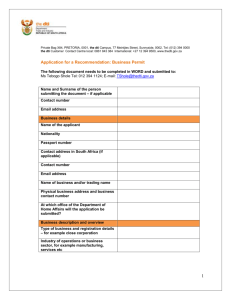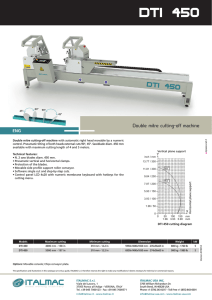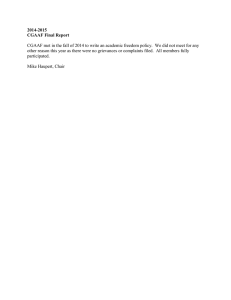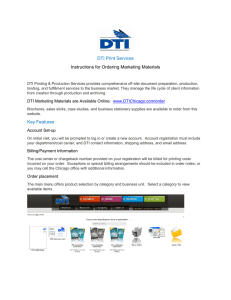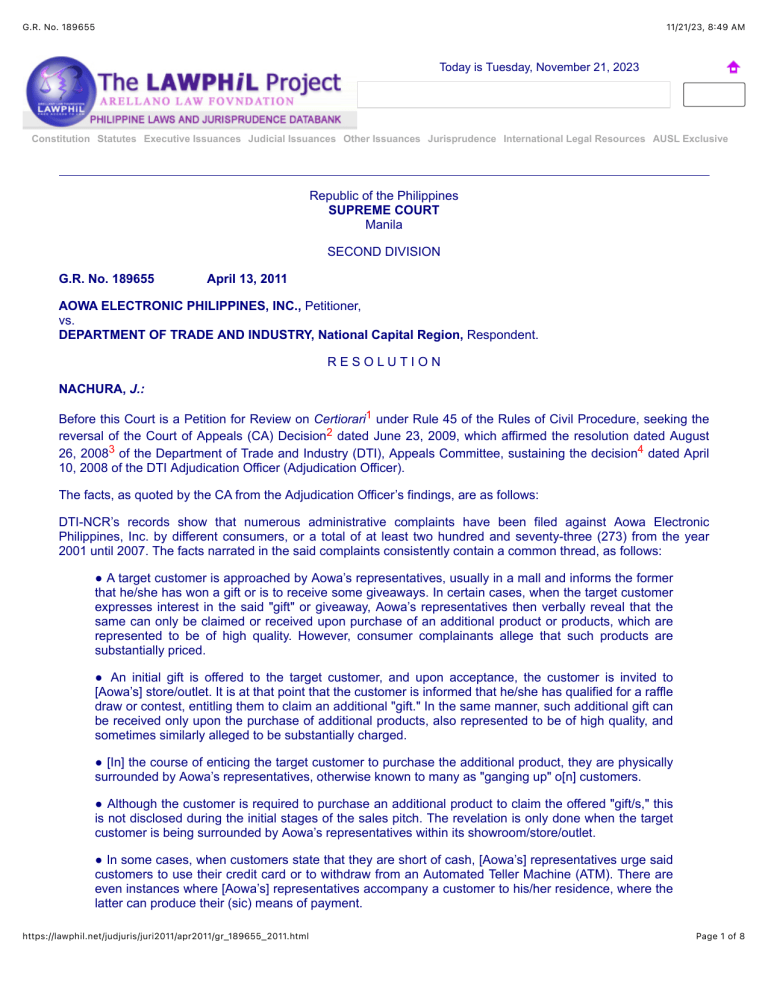
G.R. No. 189655 11/21/23, 8:49 AM Today is Tuesday, November 21, 2023 Constitution Statutes Executive Issuances Judicial Issuances Other Issuances Jurisprudence International Legal Resources AUSL Exclusive Republic of the Philippines SUPREME COURT Manila SECOND DIVISION G.R. No. 189655 April 13, 2011 AOWA ELECTRONIC PHILIPPINES, INC., Petitioner, vs. DEPARTMENT OF TRADE AND INDUSTRY, National Capital Region, Respondent. RESOLUTION NACHURA, J.: Before this Court is a Petition for Review on Certiorari1 under Rule 45 of the Rules of Civil Procedure, seeking the reversal of the Court of Appeals (CA) Decision2 dated June 23, 2009, which affirmed the resolution dated August 26, 20083 of the Department of Trade and Industry (DTI), Appeals Committee, sustaining the decision4 dated April 10, 2008 of the DTI Adjudication Officer (Adjudication Officer). The facts, as quoted by the CA from the Adjudication Officer’s findings, are as follows: DTI-NCR’s records show that numerous administrative complaints have been filed against Aowa Electronic Philippines, Inc. by different consumers, or a total of at least two hundred and seventy-three (273) from the year 2001 until 2007. The facts narrated in the said complaints consistently contain a common thread, as follows: ● A target customer is approached by Aowa’s representatives, usually in a mall and informs the former that he/she has won a gift or is to receive some giveaways. In certain cases, when the target customer expresses interest in the said "gift" or giveaway, Aowa’s representatives then verbally reveal that the same can only be claimed or received upon purchase of an additional product or products, which are represented to be of high quality. However, consumer complainants allege that such products are substantially priced. ● An initial gift is offered to the target customer, and upon acceptance, the customer is invited to [Aowa’s] store/outlet. It is at that point that the customer is informed that he/she has qualified for a raffle draw or contest, entitling them to claim an additional "gift." In the same manner, such additional gift can be received only upon the purchase of additional products, also represented to be of high quality, and sometimes similarly alleged to be substantially charged. ● [In] the course of enticing the target customer to purchase the additional product, they are physically surrounded by Aowa’s representatives, otherwise known to many as "ganging up" o[n] customers. ● Although the customer is required to purchase an additional product to claim the offered "gift/s," this is not disclosed during the initial stages of the sales pitch. The revelation is only done when the target customer is being surrounded by Aowa’s representatives within its showroom/store/outlet. ● In some cases, when customers state that they are short of cash, [Aowa’s] representatives urge said customers to use their credit card or to withdraw from an Automated Teller Machine (ATM). There are even instances where [Aowa’s] representatives accompany a customer to his/her residence, where the latter can produce their (sic) means of payment. https://lawphil.net/judjuris/juri2011/apr2011/gr_189655_2011.html Page 1 of 8 G.R. No. 189655 11/21/23, 8:49 AM In view thereof, DTI-NCR filed a Formal Charge against AOWA for violation of Articles 50 and 52 of the Consumer Act of the Philippines, praying that a Cease and Desist Order be issued, and [an] administrative fine be imposed, and other reliefs or remedies be granted as may be just and equitable under the circumstances.5 The CA further narrates: When asked to Answer, AOWA denied having violated the provisions of the Consumer Act. A notice of preliminary conference was thereafter issued, giving the parties to find (sic) ways and means to expedite the proceedings, but the scheduled preliminary conference had to be terminated, as the proposal to enter into a plea bargain agreement did not ensue. As a consequence thereof, both parties were required to submit their respective position papers. Meanwhile, a Preventive Measure Order (PMO) was issued by the DTI in order to prohibit AOWA from continuing with the act complained of until such time that a sale promotion permit is secured or obtained from the DTI. In their position paper, AOWA vehemently denied committing any violation of the provisions of the Consumer Act as it does not employ the marketing scheme described in the formal charge. AOWA argued that the mere filing of the consumer complaint does not prove outright that an offense has been committed by it, meaning that it is not a conclusive proof that it is violating the law it is charged of. It stressed that all of the consumer complaints against it have not prospered, as the cases have been amicably settled. In addition, majority of the consumer complaints which served as basis for the filing of the formal charge are already deemed barred by prescription. As far as it is concerned therefore, AOWA claims that the complaint[s are] based on mere assumption and not on established facts.6 On April 10, 2008, after considering the arguments of petitioner Aowa Electronic Philippines, Inc. (Aowa) and respondent DTI-National Capital Region (NCR), the Adjudication Officer found that the complaints against Aowa continued to increase despite its claims of amicable settlement. He also found that Aowa submitted no proof of such amicable settlement. Based on the numerous complaints against Aowa, the Adjudication Officer held that the DTI had sufficiently established prima facie evidence against Aowa for violation of the applicable provisions of Republic Act (R.A.) No. 7394, or the Consumer Act of the Philippines (the Consumer Act), and its Implementing Rules and Regulations (IRR). Furthermore, the Adjudication Officer highlighted that Aowa failed to secure any Sales Promotion Permit from the DTI for Aowa’s alleged promotional sales. Thus, he ruled: WHEREFORE, foregoing premises considered, and by virtue of the power and mandate vested in this Department, to promote and encourage fair, honest and equitable relations among parties in consumer transactions and protect the consumer against deceptive, unfair and unconscionable sales act or practices, [Aowa] is hereby declared liable under the Consumer Act of the Philippines and the Rules and Regulations Implementing the same. As a consequence thereof, it is hereby ordered, that – a) [Aowa] must permanently cease and desist from operating its business in all its stores/outlets nationwide; b) [Aowa’s] Certificates of Business Name Registration for all its stores/outlets applying the sales scheme in question be cancelled; c) [Aowa’s] application for the registration of the same or another business name be withheld by DTI if the nature thereof is the same as that mentioned in this case; d) [Aowa] must pay and/or refund to those who filed administrative complaint[s] with any DTI Office, the amount of money paid in consideration for the purchase of products sold in [Aowa’s] stores/outlets as a precondition to the claim of the gift/reward promised to be given to said complainants[; and] e) [Aowa] must pay a one time Administrative Fine of Three Hundred Thousand Pesos (₱300,000.00), Philippine currency, either in cash or in the form of Company or Manager’s check, at the DTI Cashier’s Office, 4th Floor, Trade and Industry Building, 361 Sen. Gil Puyat Ave., Makati City. Let a copy of this Decision be furnished to all Heads of DTI Provincial and Area Offices who are hereby directed to disseminate copies hereof to the Heads of Business Permit Bureau/Division of the different municipalities or cities within their respective jurisdictions for their appropriate action. SO ORDERED.7 https://lawphil.net/judjuris/juri2011/apr2011/gr_189655_2011.html Page 2 of 8 G.R. No. 189655 11/21/23, 8:49 AM Aggrieved, Aowa sought recourse from the DTI Appeals Committee, ascribing grave abuse of discretion to the Adjudication Officer. On August 26, 2008, the DTI Appeals Committee dismissed Aowa’s appeal and sustained the Adjudication Officer’s decision. It held that the techniques and schemes employed by Aowa were fraudulent, as they were being used as a bait to lure customers into buying its products. The DTI Appeals Committee noted that Aowa’s act of giving gifts and prizes to its prospective customers in order to entice the latter to enter Aowa’s store and to purchase its products is a common thread in every complaint lodged against Aowa before the DTI.8 Unperturbed, Aowa filed a petition for certiorari under Rule 65 of the Rules of Civil Procedure before the CA. On June 23, 2009, the CA affirmed the findings and ruling of the DTI Appeals Committee. The CA heavily relied on the findings of the Adjudication Officer and the DTI Appeals Committee, showing that Aowa committed acts of misrepresentation against its customers, clearly violative of the Consumer Act. Likewise, the CA affirmed the lower agencies’ findings that Aowa indeed did not secure any Sales Promotion Permit for its promotional sales.9 Unyielding, Aowa filed its motion for reconsideration, which the CA, however, denied in its Resolution10 dated September 29, 2009. Hence, this petition based on the following grounds: [I.] WITH DUE RESPECT, THE HONORABLE COURT OF APPEALS GRAVELY ERRED WHEN IT RULED THAT THERE IS SUFFICIENT BASIS IN THE FILING OF THE FORMAL CHARGE AGAINST HEREIN PETITIONER NOTWITHSTANDING THE FACT THAT THE SAID FORMAL CHARGE WAS MERELY BASED ON CONSUMER COMPLAINTS WHICH HAVE ALL BEEN AMICABLY SETTLED AND DISMISSED. MOREOVER, THE HEREIN RESPONDENT DOES NOT HAVE ANY PERSONAL KNOWLEDGE OF THE CIRCUMSTANCES SURROUNDING ALL THE CONSUMER COMPLAINTS FILED AGAINST THE PETITIONER[;] [II.] WITH DUE RESPECT, THE HONORABLE COURT OF APPEALS GRAVELY ERRED WHEN IT AFFIRMED THE HARSH AND EXCESSIVE DECISION OF THE DEPARTMENT OF TRADE AND INDUSTRY, APPEALS COMMITTEE ORDERING THE HEREIN PETITIONER TO PERMANENTLY CEASE AND DESIST FROM OPERATING ITS BUSINESS AND IN ADDITION TO PAY THE MAXIMUM FINE PROVIDED UNDER THE LAW NOTWITHSTANDING THE FACT THAT THE FORMAL CHARGE IS NOT SUPPORTED BY ANY CONCRETE, SUFFICIENT AND CONVINCING EVIDENCE[; AND] [III.] WITH DUE RESPECT, THE HONORABLE COURT OF APPEALS GRAVELY ERRED IN ITS RULING THAT THE ASSAILED RESOLUTION’S ORDER MAY BE ENFORCED NATIONWIDE DESPITE THE FACT THAT THE COMPLAINT PERTAINS TO CASES IN THE NATIONAL CAPITAL REGION ONLY[.]11 Aowa claims that the complaints filed against it merely pertain to cases in the NCR, hence, there was no basis for the DTI to presume that the alleged offenses committed by petitioner are likewise practiced in other places in the country; that DTI never denied Aowa’s averment that the cases filed against it by customers were already and actually settled; that the mere filing of numerous complaints does not prove outright that an offense has been committed; and that the complaints were based on mere assumptions and not on established facts. Moreover, Aowa’s act of amicably settling the cases with the consumer-complainants manifests Aowa’s good faith and fair dealing with its patrons, not commensurate with the penalty of closure and the maximum fine imposed by the DTI. Finally, Aowa denies that it committed fraud and/or deceit in violation of the Consumer Act. Good faith must always be presumed. Aowa postulates that like other companies, its sales personnel are employed to convince potential customers to purchase the products they are selling, inclusive of enthusiasm in sales talk and overzealousness which cannot and should not be considered as deceit. Customers in this case were never deprived of their prerogative to refuse the offer of the sales agents of Aowa, as the terms and conditions of the sale were fully explained to all of its customers.12 On the other hand, the DTI, through the Office of the Solicitor General (OSG), claims that there is sufficient basis for the filing of the formal charge against petitioner; that through Assistant Secretary Ma. Theresa L. Pelayo, acting as Regional Caretaker, it filed the formal charge against Aowa based on the numerous complaints filed against the latter and pursuant to Article 15913 of the Consumer Act; that said complaints constituted prima facie violation of the https://lawphil.net/judjuris/juri2011/apr2011/gr_189655_2011.html Page 3 of 8 G.R. No. 189655 11/21/23, 8:49 AM Consumer Act; that, as such, Aowa has the burden to overcome the presumption by proof to the contrary; and that Aowa, however, failed to discharge the said burden. The OSG argues that, contrary to Aowa’s assertion, the amicable settlement allegedly entered by Aowa and its consumer-complainants is not a ground for the dismissal of the formal charge because Aowa, despite respondent’s issuance of a Preventive Measure Order14 (PMO) on July 31, 2009, continues to enter and engage in the same acts and/or transactions complained of. Consonant with the findings of the lower agencies and the CA, the OSG asseverates that Aowa, after it was afforded its right to due process, was correctly found liable for violation of the Consumer Act through misrepresentation, and for its failure to secure any Sales Promotion Permit from the DTI. Moreover, the directive of the Adjudication Officer of closure and imposition of the maximum fine of ₱300,000.00 is in accordance with law and its IRR.15 Correlatively, Aowa assailed the validity of the PMO with the Regional Trial Court (RTC) of Makati City, Branch 143, docketed as Civil Case No. 09-723. The RTC, however, dismissed the case for lack of jurisdiction. Unyielding, in a Petition for Prohibition, Aowa went to the CA which, in its Resolution16 dated October 27, 2009, dismissed Aowa’s case for its failure to file the petition within the prescribed period. The said CA Resolution became final and executory on January 28, 2010.17 In a Manifestation,18 the counsel of Aowa intimated that Aowa no longer intends to file a reply to the OSG’s Comment, on the ground that the discussions made therein had already been addressed in the instant Petition. Counsel, however, also intimated that Aowa left its known office address without informing him of the location of its new office. The sole issue in this case is whether or not the CA committed any reversible error in affirming the findings and ruling of the Adjudication Officer and the DTI Appeals Committee. The Petition is bereft of merit. Contrary to Aowa’s postulations, the DTI has the authority and the mandate to act upon the complaints filed against Aowa. Article 2 of the Consumer Act clearly sets forth the policy of the State on consumer protection, viz.: ART 2. Declaration of Basic Policy. — It is the policy of the State to protect the interests of the consumer, promote his general welfare and to establish standards of conduct for business and industry. Towards this end, the State shall implement measures to achieve the following objectives: a) protection against hazards to health and safety; b) protection against deceptive, unfair and unconscionable sales acts and practices; c) provision of information and education to facilitate sound choice and the proper exercise of rights by the consumer; d) provision of adequate rights and means of redress; and e) involvement of consumer representatives in the formulation of social and economic policies. This policy is reiterated in Article 48 of the Consumer Act, which provides that "the State shall promote and encourage fair, honest and equitable relations among parties in consumer transactions and protect the consumer against deceptive, unfair and unconscionable sales acts or practices." Verily, as espoused by the OSG, the DTI validly invoked Article 159 of the Consumer Act in order to effectuate this policy of the State by filing a formal charge against Aowa. It is indubitable that the DTI is tasked to protect the consumer against deceptive, unfair, and unconscionable sales, acts, or practices, as defined in Articles 50 and 52 of the Consumer Act.19 The law is clear. Articles 50 and 52 of the Consumer Act provide: ART. 50. Prohibition Against Deceptive Sales Acts or Practices. — A deceptive act or practice by a seller or supplier in connection with a consumer transaction violates this Act whether it occurs before, during or after the transaction. An act or practice shall be deemed deceptive whenever the producer, manufacturer, supplier or seller, through concealment, false representation [or] fraudulent manipulation, induces a consumer to enter into a sales or lease transaction of any consumer product or service. Without limiting the scope of the above paragraph, the act or practice of a seller or supplier is deceptive when it https://lawphil.net/judjuris/juri2011/apr2011/gr_189655_2011.html Page 4 of 8 G.R. No. 189655 11/21/23, 8:49 AM represents that: a) a consumer product or service has the sponsorship, approval, performance, characteristics, ingredients, accessories, uses, or benefits it does not have; b) a consumer product or service is of a particular standard, quality, grade, style, or model when in fact it is not; c) a consumer product is new, original or unused, when in fact, it is in a deteriorated, altered, reconditioned, reclaimed or second-hand state; d) a consumer product or service is available to the consumer for a reason that is different from the fact; e) a consumer product or service has been supplied in accordance with the previous representation when in fact it is not; f) a consumer product or service can be supplied in a quantity greater than the supplier intends; g) a service, or repair of a consumer product is needed when in fact it is not; h) a specific price advantage of a consumer product exists when in fact it does not; i) the sales act or practice involves or does not involve a warranty, a disclaimer of warranties, particular warranty terms or other rights, remedies or obligations if the indication is false; and j) the seller or supplier has a sponsorship, approval, or affiliation he does not have. xxxx ART. 52. Unfair or Unconscionable Sales Act or Practice. — An unfair or unconscionable sales act or practice by a seller or supplier in connection with a consumer transaction violates this Chapter whether it occurs before, during or after the consumer transaction. An act or practice shall be deemed unfair or unconscionable whenever the producer, manufacturer, distributor, supplier or seller, by taking advantage of the consumer's physical or mental infirmity, ignorance, illiteracy, lack of time or the general conditions of the environment or surroundings, induces the consumer to enter into a sales or lease transaction grossly inimical to the interests of the consumer or grossly onesided in favor of the producer, manufacturer, distributor, supplier or seller. In determining whether an act or practice is unfair and unconscionable, the following circumstances shall be considered: a) that the producer, manufacturer, distributor, supplier or seller took advantage of the inability of the consumer to reasonably protect his interest because of his inability to understand the language of an agreement, or similar factors; b) that when the consumer transaction was entered into, the price grossly exceeded the price at which similar products or services were readily obtainable in similar transaction by like consumers; c) that when the consumer transaction was entered into, the consumer was unable to receive a substantial benefit from the subject of the transaction; d) that when the consumer transaction was entered into, the seller or supplier was aware that there was no reasonable probability or payment of the obligation in full by the consumer; and e) that the transaction that the seller or supplier induced the consumer to enter into was excessively onesided in favor of the seller or supplier. It cannot be gainsaid that the DTI acted on the basis of about 273 consumer complaints against Aowa, averring a common and viral scheme in carrying out its business to the prejudice of consumers. Complaints — filed by consumers residing not only within the NCR but also in the provinces20 ¾ continued to be filed even after the formal charge and the issuance of the PMO. In this regard, we quote with affirmation and accord respect to the factual findings of the CA, to wit: https://lawphil.net/judjuris/juri2011/apr2011/gr_189655_2011.html Page 5 of 8 G.R. No. 189655 11/21/23, 8:49 AM [Aowa], in employing the sales scheme described by customers in their complaints in order to entice customers to purchase [its] products clearly violated Article 52 of the Consumer Act of the Philippines. As found by public respondent DTI whose findings We heretofore adopt: "It is undisputed that the techniques/scheme employed by [Aowa] were fraudulently (sic) considering that the same were being used as a bait to lure customers into buying it products. [Aowa’s] customary act of giving gifts and the so called prizes to its prospective customers in order to entice them to enter the store outlet and later convincing (sic) them to purchase the products [it is] selling are (sic) but common trends (sic) that occurred in every complaint lodged against [Aowa] before the DTI-NCR and regional offices. In such manner, it is evident that the said scheme is actually the means by which [Aowa] operates its business. Simply, it is intrinsically connected to the business itself of and had [Aowa] not employed those techniques, customers would not have transacted with it." In doing so, [Aowa], as seller, through its representatives stationed usually in malls, entice consumers into purchasing their products by taking advantage of the latter’s physical or mental infirmity, ignorance, illiteracy, lack of time or the general conditions of the environment or surroundings. This is done by misrepresenting to the consumer that he/she has won a gift or is to receive some giveaways when in truth, these gifts can only be claimed or received upon purchase of an additional product or products, again misrepresented by [Aowa to] be of high quality. This is how [Aowa] operates its business, and not simply as a means of promotional sale. The act sought to be avoided and punished under the Consumer Act has clearly been committed by Aowa.21 By reason of the special knowledge and expertise of the DTI over matters falling under its jurisdiction, it is in a better position to pass judgment on the issues, and its findings of fact in that regard, especially when affirmed by the CA, are generally accorded respect, if not finality, by this Court.22 Furthermore, Aowa failed to refute DTI’s finding that it did not secure any permit for its alleged promotional sales. In sum, Aowa failed to show any reversible error on the part of the CA in affirming the ruling of the DTI as to warrant the modification much less the reversal of its assailed decision. A final note. In these trying times when fly-by-night establishments and syndicates proliferate all over the country, lurking and waiting to prey on innocent consumers, and ganging up on them like a pack of wolves with their sugar-coated sales talk and false representations disguised as "overzealous marketing strategies," it is the mandated duty of the Government, through its various agencies like the DTI, to be wary and ready to protect each and every consumer. To allow or even tolerate the marketing schemes such as these, under the pretext of promotional sales in contravention of the law and its existing rules and regulations, would result in consumers being robbed in broad daylight of their hard earned money. This Court shall not countenance these pernicious acts at the expense of consumers. WHEREFORE, the Petition is DENIED and the Court of Appeals Decision dated June 23, 2009 is AFFIRMED. Costs against petitioner. SO ORDERED. ANTONIO EDUARDO B. NACHURA Associate Justice WE CONCUR: ANTONIO T. CARPIO Associate Justice Chairperson DIOSDADO M. PERALTA Associate Justice ROBERTO A. ABAD Associate Justice JOSE CATRAL MENDOZA Associate Justice ATTESTATION https://lawphil.net/judjuris/juri2011/apr2011/gr_189655_2011.html Page 6 of 8 G.R. No. 189655 11/21/23, 8:49 AM I attest that the conclusions in the above Resolution had been reached in consultation before the case was assigned to the writer of the opinion of the Court’s Division. ANTONIO T. CARPIO Associate Justice Chairperson, Second Division CERTIFICATION Pursuant to Section 13, Article VIII of the Constitution and the Division Chairperson's Attestation, I certify that the conclusions in the above Resolution had been reached in consultation before the case was assigned to the writer of the opinion of the Court’s Division. RENATO C. CORONA Chief Justice Footnotes 1 Rollo, pp. 11-32. 2 Penned by Associate Justice Jose L. Sabio, Jr., with Associate Justices Vicente S.E. Veloso and Ricardo R. Rosario, concurring; id. at 36-52. 3 Id. at 54-58. 4 Id. at 59-66. 5 Supra note 2, at 37-39. 6 Id. at 39-40. 7 Supra note 4, at 65-66. 8 Supra note 3. 9 Supra note 2. 10 Rollo, pp. 68-69. 11 Supra note 1, at 20-21. 12 Id. 13 Article 159 of the Consumer Act provides, to wit: ART. 159. Consumer Complaints. – The concerned department may commence an investigation upon petition or upon letter-complaint from any consumer: Provided, That, upon a finding by the department of a prima facie violation of any provisions of this Act or any rule or regulation promulgated under its authority, it may motu proprio or upon verified complaint commence formal administrative action against any person who appears responsible therefor. The department shall establish procedures for systematically logging in, investigating and responding to consumer complaints into the development of consumer policies, rules and regulations, assuring as far as practicable simple and easy access on the part of the consumer to seek redress for his grievances. 14 Entitled "Department of Trade and Industry-National Capital Region, Hon. Vice-President Manuel ‘Noli’ de Castro and Jesse Hermogenes T. Andres v. Aowa Electronics Philippines, Inc., Home Depot Macapagal Avenue, Pasay City," particularly docketed as Adm. Case No. 09-186; rollo, pp. 152-153. https://lawphil.net/judjuris/juri2011/apr2011/gr_189655_2011.html Page 7 of 8 G.R. No. 189655 11/21/23, 8:49 AM 15 Id. at 132-149. 16 Id. at 176-177. 17 Id. at 178. 18 Id. at 193-195. 19 Islamic Da'wah Council of the Phils., Inc. v. Office of the Executive Secretary, 453 Phil. 440, 451-452 (2003). 20 Rollo, pp. 167-175. 21 Supra note 2, at 45-46. 22 Metal Forming Corp. v. Office of the President, 317 Phil. 853, 861 (1995). The Lawphil Project - Arellano Law Foundation https://lawphil.net/judjuris/juri2011/apr2011/gr_189655_2011.html Page 8 of 8
